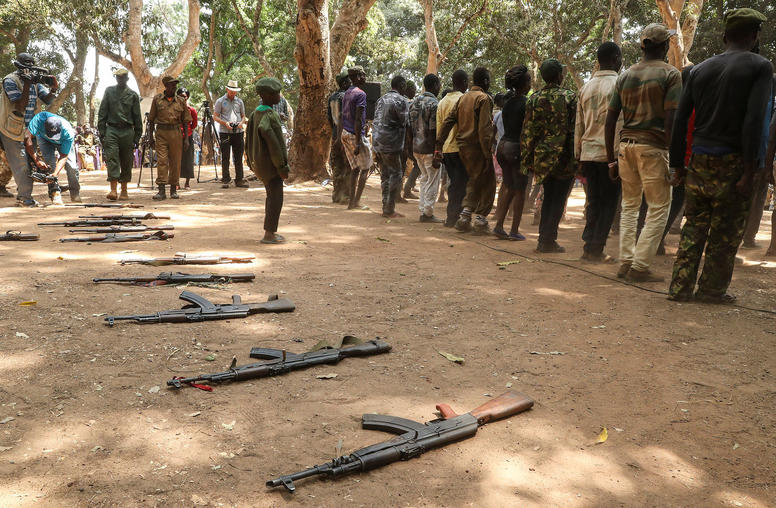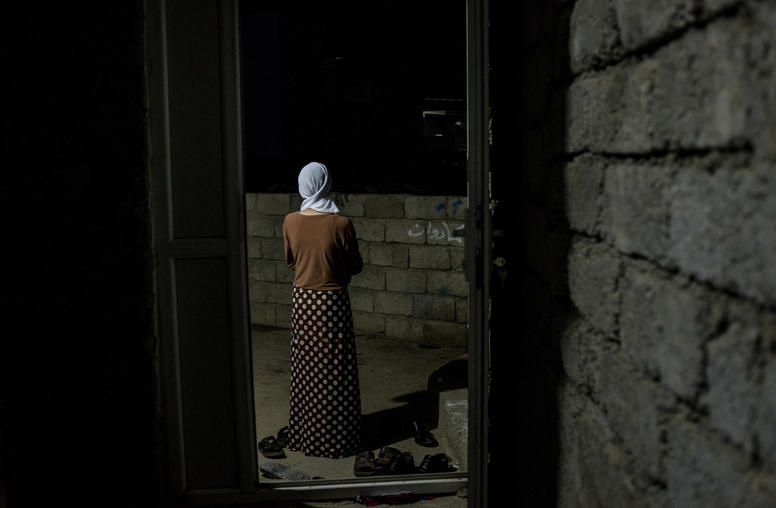Publications
Articles, publications, books, tools and multimedia features from the U.S. Institute of Peace provide the latest news, analysis, research findings, practitioner guides and reports, all related to the conflict zones and issues that are at the center of the Institute’s work to prevent and reduce violent conflict.

Kathleen Kuehnast on the 2018 Nobel Peace Prize Winners
Highlighted by the 2018 Nobel Peace Prize award to Dr. Denis Mukwege and Nadia Murad—advocates for survivors of wartime sexual violence—the issue of sexual abuse has gained international recognition. USIP’s Kathleen Kuehnast attended the ceremony, saying, “People were standing in solidarity to what they were hearing. We can no longer be indifferent about this type of criminal activity.”

Dr. Kathleen Kuehnast on International Women’s Month
For International Women’s Month, Kathleen Kuehnast underscores the importance of women’s contribution to peace and security. Dr. Kuehnast argues that the new millennium, whether through U.N. Security Council Resolution 1325 or less formal engagement via social media, has empowered women to take a greater role in peace building.

Kathleen Kuehnast on the 20th Anniversary of UN Resolution 1325
Two decades after the passage of the landmark resolution on women, peace and security, USIP’s Kathleen Kuehnast points to the 86 countries that have taken action to address the unique experience of women in conflict as proof of progress, but says that getting women more involved in peace processes is “a long game … it is difficult to find room for women at any table.”

Kathleen Kuehnast on Women in Conflict Zones
At a recent USIP event, Nobel laureate Nadia Murad discussed her efforts to end sexual violence and human trafficking—two criminal practices that Kathleen Kuehnast says “have been institutionalized and militarized.” To disincentivize these human rights abuses, Kuehnast says we must reinforce that these heinous but often lucrative practices are “not a livelihood—this is criminality.”

Kathleen Kuehnast on the Inaugural Women Building Peace Award
USIP’s Kathleen Kuehnast discusses the inspiring work of Women Building Peace Award recipient Rita Lopidia of South Sudan, as well as the other finalists, praising “the incredible resilience that each of these 10 women has brought to situations of inequality, of extreme violence, and despair.”

Kathleen Kuehnast on Preventing Conflict-Related Sexual Violence
Last month, the U.N. Security Council echoed past assessments that not enough has been done to address conflict-related sexual violence. But researchers “have established that this particular crime of war is not inevitable,” says USIP’s Kathleen Kuehnast, and there are new strategies for “how best to address the trauma” and prevent it.

Our Dangerous Children: The Global Risks of Neglect
Intermittently, images spring from the news to shock us with the suffering of children brutalized by war or their families' desperate flight as refugees. Three years ago, the body of Alan Kurdi, a Syrian boy drowned on a Turkish beach, administered that shock. Central American children uprooted by the violence of Honduras or El Salvador now underscore the same message—that amid the world's people scarred by war and violence, a special danger is children. Among the 65 million people torn from their homes, most by warfare, roughly half are children.

Kathleen Kuehnast on a Survivor-Centric Path to Ending Sexual Violence in War
Conflict-related sexual violence “not just violates the physical, but the mental and social integrity of societies.” To address this crime, USIP’s Kathleen Kuehnast says we need a survivor-centered approach: “Survivors are experts, they need to be [present] at every part of our understanding and … policy-shaping.”

America can build peace better—if it includes women.
The United States is making a publicly little-noted stride this month to strengthen its response to the violent crises worldwide that have uprooted 80 million people, the most ever recorded. Officials are overhauling America’s method for supporting the “fragile” states whose poor governance breeds most of the world’s violent conflict. Yet the proven new approach—helping these countries meet their people’s needs and thus prevent violence and extremism—will fall short if its implementation fails to include and support women in every step of that effort. Fortunately, an earlier reform to U.S. policy offers practical lessons for doing so.

Five Gains and Gaps in the Campaign to End Conflict-Related Sexual Violence
The wars of the 1990s — particularly in the former Yugoslavia, Rwanda, Sierra Leone and the Democratic Republic of the Congo (DRC) — saw the devastating use of sexual violence not only by individual subordinate soldiers, but as deliberate tactics of war by state and non-state armed actors. In response, a wave of strong advocacy from women’s civil society organizations called for an end to these acts of violence, and their vision was eventually incorporated into U.N. Security Council Resolution (UNSCR) 1325 and what is now known as the Women, Peace and Security (WPS) agenda in 2000.